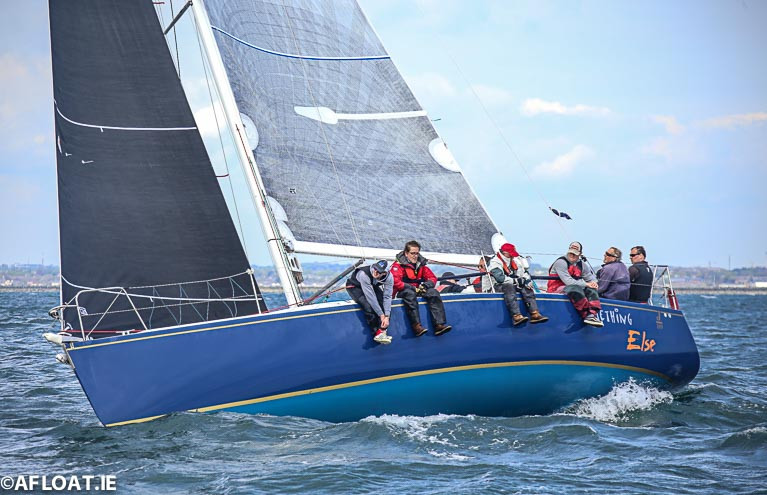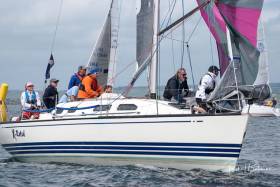Displaying items by tag: Sovereigns' Cup
2021 Irish Sailing Calendar Has Early Fixture Clashes
The wholesale cancellation of early 2020 regatta fixtures, is impacting the 2021 season with some conflicting dates appearing for May and June 2021.
So far, four key fixtures of Irish interest appear to be affected next season.
Firstly, Scotland's biggest sailing event, The Scottish Series at Troon, cancelled amid Covid-19 concerns last week, has published its usual UK Bank Holiday date of May 28-31 for 2021's edition. The Loch Fyne event is a traditional season opener in which Irish boats have dominated in recent years but 2021 may now lack Irish competition because this is also the date of the 2021 ICRA National Championships at the National Yacht Club at Dun Laoghaire on Dublin Bay.
A month later, Bangor Town Regatta on Belfast Lough, also cancelled last week, has been rescheduled for June 24-27, but this is the same long-standing date occupied by Kinsale Yacht Club's biennial Sovereign's Cup on the south coast.
So far, the rest of the 2021 season appears to be non-conflicting with the Dun Laoghaire Dingle 2021 Race on June 9 and Dun Laoghaire Regatta on July 8-11.
Attempts are usually made to avoid regatta date clashes because organisers typically like to attract visiting boats from outside a local catchment area for major events but when dates overlap this becomes impossible.
Sovereign's Cup 'Portcullis Trophy' Win is Another South Coast Victory for Mayo X332, X-Rated
A 'late' West Coast campaign won the prestigious Portcullis Trophy at the Sovereign's Cup for skipper John Gordon and the crew of his X332 X-Rated from Mayo Sailing Club last week. Afloat takes a look at how this 'no rockstar' boat won the overall prize for the best performance under ECHO handicap.
Gordon purchased the 2000-built in 2005 and while his X-Yacht would go on to score some notable wins over the next decade her debut season was far from ideal, losing the mast while racing on Galway Bay.
The following season, in 2006, the crew won the X-332 Class in Cork Week 2006, and followed that up in 2008 by winning the Class again; that event incorporated the UK and Ireland X-332 National Championship.
The boat is part of the Mayo Sailing Club cruiser fleet, based in Rosmoney, on Clew Bay. At the time X-Rated arrived Mayo SC had four competitive X-332s racing regularly in a highly competitive fleet, creating effective one-design racing and pushing up the standard – sadly now only two race regularly but the Mayo SC cruiser fleet is still highly competitive.
The X-Rated crew consists of Boyd Gale on main, Andrew Beatty calling tactics, Noeleen McCool and Paul Howard trimming, Dave O’Neill and Dermot Higgins on foredeck, James Geraghty on strings, and John Gordon driving. All crew live in County Mayo. 'No rockstars', says the skipper.
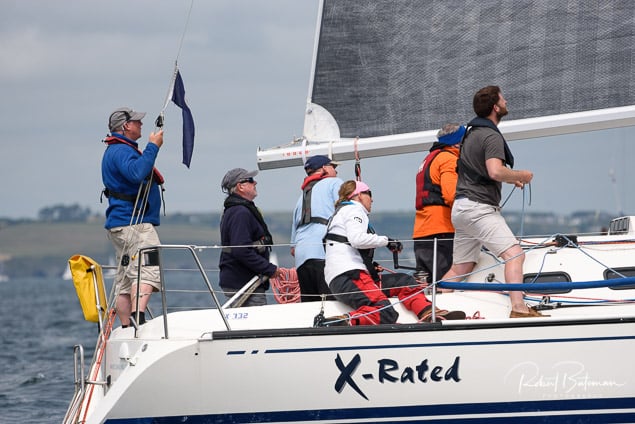 The X Rated crew from Mayo Sailing Club Photo: Bob Bateman
The X Rated crew from Mayo Sailing Club Photo: Bob Bateman
The boat was delivered to Kinsale for the Sovereign's Cup last week by James Geraghty, accompanied by Andrew Beatty and Pierce O’Donnell. They made the trip in one hop over a period of 42-hours in a west to northwest wind.
There was a long and heavy beat out of Clew Bay, but once they turned the corner winds were favourable and they decided to keep going.
"Our campaign really only started this Spring; we had to replace all our standing rigging last year and lost most of the season as a result, so our preparation was somewhat limited, Gordon told Afloat.
"We ordered a new mainsail from Yannick Lemonnier in Galway, which was very kindly sponsored by Molloys Lifetime Pharmacies, based in Ballina, and this upped our game a good deal. Although we have been sailing together for a long time, we were a little regatta rusty and it took us a while to get up to speed" he says.
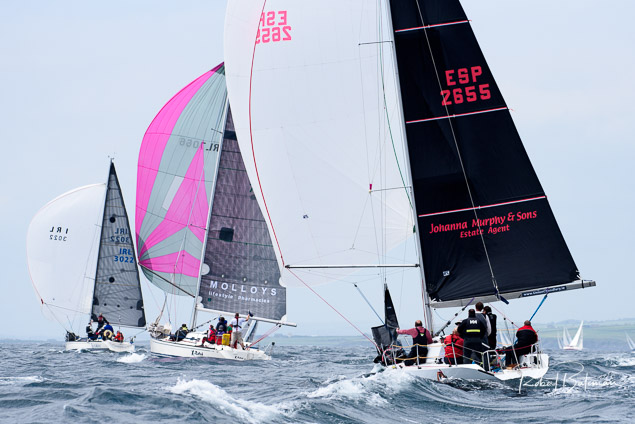 Rolling downwind in big seas on the first day of the Sovereign's Cup Photo: Bob Bateman
Rolling downwind in big seas on the first day of the Sovereign's Cup Photo: Bob Bateman
In reviewing last week's victory, John Gordon says "Sovereign's Cup was great and very well organised. The first day was hard work and I think there was general relief in the fleet when Jack Roy – who did a great job –cancelled the second day"
"Friday’s racing started well with a very intriguing reaching start, but the heavy fog that descended in the second race was eerie and the left-over swell was difficult to manage. Saturday’s racing was pure bliss, sunshine, flat sea, good courses".
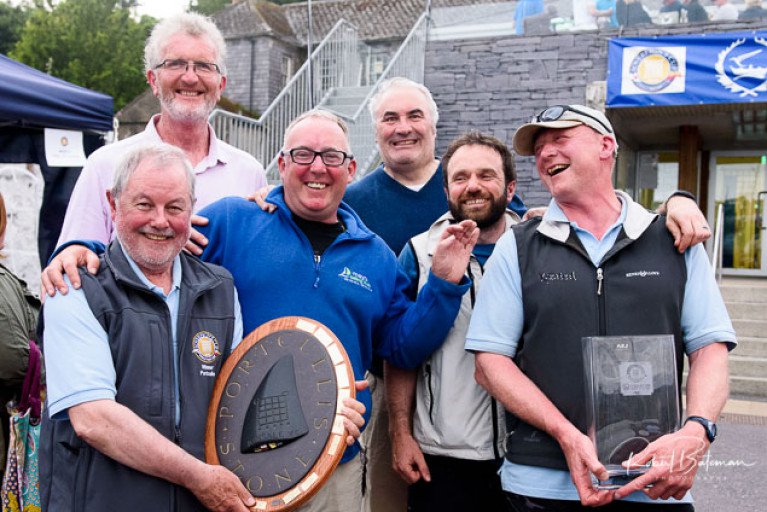 John Gordon (holding the Portcullis trophy on left) with the 'X-Rated' crew from Mayo Sailing Club Photo: Bob Bateman
John Gordon (holding the Portcullis trophy on left) with the 'X-Rated' crew from Mayo Sailing Club Photo: Bob Bateman
All the crew have full-time jobs and families, so going to another event this year is probably not on the cards but, says Gordon, "We seem to enjoy the south coast, however, so there is some quiet talk about Cork Week next year…"


























